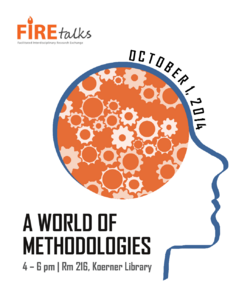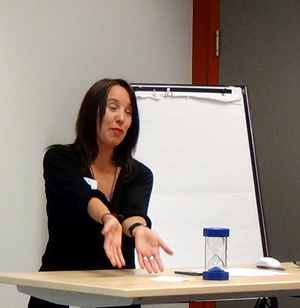Documentation:Research Commons/FIRE Talks/2014-2015/A World of Methodologies
A World of Methodologies

WHAT: Tell us about the methods used in your discipline. What theoretical frameworks do you use to interpret knowledge? What research tools help you solve problems in your field of study? Come to the first FIREtalk of the year, share your process, and pick up some new research techniques.
- Spark your thinking: Consider mixed methods, interdisciplinarity, the creative process, logic, non-traditional theses, technology, data visualization, statistics, performance, ceremony, and other research tools.
WHEN: Wednesday, October 1, 2014, 4-6pm
WHERE: Koerner Library, Room 216
Presentations
- A Day in the Life: Case studies of two older adults – Neringa Kubiliene (Interdisciplinary Studies)
- Action Research: What It Can Offer You, Me and Us? – Latika Raisinghani (Education)
- Analyzing discourses of knowledge – Fernando Murillo (Curriculum Studies)
- Exploring microbial interaction networks using Hive plots – Sarah Perez (Bioinformatics)
- Growing guts to cure disease – Natalie Marshall (Microbiology)
- Indigenous Research Methods – Lyana Patrick (Community and Regional Planning)
- Institutional ethnography and its application in empirical research – Heather Holroyd (Sociology)
- Problems with Likert scales and an alternative scale format - Xijuan Zhang (Psychology)
Contact us
If you have any comments or questions, please contact us at research.commons@ubc.ca.
Resources
A Day in the Life: Case studies of two older adults - Neringa Kubiliene
- Dmytro, D., Kubiliene, N. & Cameron, C.A. (2014). Agentive and communitarian play in early childhood. Early Child Development and Care. doi:10.1080/03004430.2014.894033
- Gillen, J., & Cameron, C. A. (2010). International perspectives on early childhood research: a day in the life. Palgrave Macmillan.

Action Research: What It Can Offer You, Me and Us? - Latika Raisinghani
- Adelman, C. (1993). Kurt Lewin and the origins of action research . Educational Action Research 1 (1), 7-24.
- Carr, W., Kemmis, S. (1986). Becoming critical: Education, knowledge, and action research . London: Falmer Press.
- Kemmis, S. (2009). Action research as a practice-based practice. Educational Action Research, 17(3), 463-474. doi:10.1080/09650790903093284
- Kemmis, S. (2010): What is to be done? The place of action research. Educational Action Research, 18 (4), 417-427.
Analyzing discourses of knowledge - Fernando Murillo
- Dijk, Teun A. van. Discourse and Power. Houndmills, Basingstoke, Hampshire [England]; New York: Palgrave Macmillan, 2008. P302.77 .D55 2008 Koerner Library
- Wodak, Ruth, and Michael Meyer. Methods of Critical Discourse Analysis. London; Los Angeles: SAGE, 2009. P302 .M3945 2009 Koerner Library and UBC Okanagan
- Excerpt from Noam Chomsky and Michael Foucault debate: https://www.youtube.com/watch?v=kawGakdNoT0

Exploring microbial interaction networks using Hive plots - Sarah Perez
- Martin Krwzywinski's website explaining and motivating hive plots: http://www.hiveplot.net/
- Sarah's hive plotter tool: https://github.com/sperez8/HivePlotter
- Nature paper: Faust K, Raes J. Microbial interactions: From networks to models. Nature reviews.Microbiology. 2012;10(8):538-50.
Growing guts to cure disease - Natalie Marshall
- E. coli infection strategy video: https://www.youtube.com/watch?v=gnNFNI9_pT0
- Article summarizing "In vitro and in vivo model systems for studying enteropathogenic Escherichia coli infections": http://www.ncbi.nlm.nih.gov/pubmed/23457294 (Require access to article.) Or order (for free) via UBC Library InterLibrary Loan.
- Primary article examining human intestinal cell models with E. coli infection: Dean P, Young L, Quitard S, Kenny B. Insights into the pathogenesis of enteropathogenic E. coli using an improved intestinal enterocyte model. PloS one. 2013;8(1):e55284. Also available at http://www.ncbi.nlm.nih.gov/pmc/articles/PMC3557262/
- Skloot, Rebecca. The Immortal Life of Henrietta Lacks. London: Macmillan, 2010. QZ201 .S5564 2010 Woodward Library Great Reads, QZ201 .S5564 2010a UBC Okanagan

Indigenous Research Methods - Lyana Patrick
- Absolon, Kathleen E. (Minogiizhigokew). (2011). Kaandossiwin: How we come to know. Halifax & Winnipeg: Fernwood Publishing. Recently arrived at Xwi7xwa Library
- Kovach, Margaret. (2009). Indigenous methodologies: Characteristics, conversations, and contexts. Toronto: U. of Toronto Press. Multiple holdings.
- Wilson, Shawn. (2008). Research is ceremony: Indigenous research methods. Halifax & Winnipeg: Fernwood Publishing. Multiple holdings: Xwi7xwa, Koerner/UBC Okanagan and Online.
Institutional ethnography and its application in empirical research - Heather Holroyd
- Smith, Dorothy E. 2005. Institutional Ethnography: A Sociology for People. Lanham, MD: AltaMira Press.GN345 .S57 2005 Koerner and UBC Okanagan
- Smith, Dorothy E. 1987. The Everyday World as Problematic: A Feminist Sociology. Pp. 49-104. Toronto: University of Toronto Press. HM51 .S638 1987 Multiple Holdings
Problems with Likert scales and an alternative scale format - Xijuan Zhang
- Lindwall, M., Barkoukis, V., Grano, C., Lucidi, F., Raudsepp, L., Liukkonen, J, & Thøgersen-Ntoumani, C. (2012). Method effects: the problem with negatively versus positively keyed items . Journal of Personality Assessment, 94, 196-204. doi: 10.1080/00223891.2011.645936
- DiStenfano, C., & Motl, R. W. (2006). Further investigating method effects associated with negatively worded items on self-report surveys. Structural Equation Modeling, 13, 440-464. doi: 10.1207/s15328007sem1303_6
- Sonderen E. V., Sanderman, R., & Coyne, J. C. (2013). Ineffectiveness of reverse wording of questionnaire items: let’s learn from cows in the rain . PloS ONE, 8(7): 10.1371/annotation/af78b324-7b44-4f89-b932-e851fe04a8e5. doi: 10.1371/annotation/af78b324-7b44-4f89-b932-e851fe04a8e5